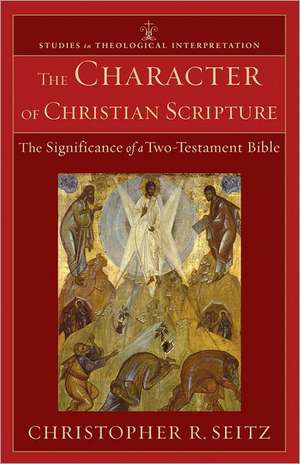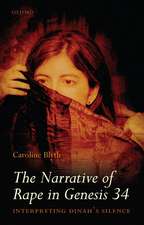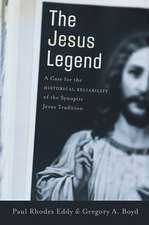The Character of Christian Scripture – The Significance of a Two–Testament Bible
Autor Christopher R. Seitz, Craig Bartholomew, Joel Green, Christopher Seitzen Limba Engleză Paperback – 31 oct 2011
Christopher Seitz, an internationally renowned expert in canonical interpretation, illuminates the two-testament character of Scripture and its significance for the contemporary church. He interacts critically with current interest in the New Testament's use of the Old Testament and addresses an issue of perennial concern: how to hear both testaments as Christian witness.
Preț: 214.79 lei
Nou
Puncte Express: 322
Preț estimativ în valută:
41.10€ • 43.03$ • 34.01£
41.10€ • 43.03$ • 34.01£
Carte disponibilă
Livrare economică 17-31 martie
Preluare comenzi: 021 569.72.76
Specificații
ISBN-13: 9780801039485
ISBN-10: 0801039487
Pagini: 224
Dimensiuni: 143 x 214 x 16 mm
Greutate: 0.39 kg
Editura: Baker Publishing Group – Baker Books
ISBN-10: 0801039487
Pagini: 224
Dimensiuni: 143 x 214 x 16 mm
Greutate: 0.39 kg
Editura: Baker Publishing Group – Baker Books
Textul de pe ultima copertă
"In this learned, astute, and graceful study, Christopher Seitz reflects on the significance of the two-testament form of the Bible for understanding the character of Christian Scripture. It is a commanding account of the matter from a master of biblical theology."
--John Webster, King's College, Aberdeen
"Seitz carries forward the work of Brevard Childs and his canonical approach to the theological interpretation of Scripture. Seitz argues that the rich, diverse, and unique theological resources of the Old Testament should be allowed their own integrity in dialogue with the witness of the New Testament. He rightly argues that the Christian Bible is unique in its bi-testamentality and thus requires a correspondingly unique theological hermeneutic as it testifies to the Triune God of Christian faith."
--Dennis Olson, Princeton Theological Seminary
"What does it mean for the Christian Bible to have two testaments? Seitz, the foremost proponent of the canonical approach today, demonstrates how this deceptively simple question leads us to the heart of the challenge of reading the Bible theologically. Incisive in its criticisms, sound in its proposals, and ecclesial in its concerns, this is an exhilarating contribution to biblical theology."
--Nathan MacDonald, University of GOttingen and University of St. Andrews
"Seitz has long been blazing an exciting trail in thinking through the theological reality of a single, two-testament Bible. Here--in vigorous, challenging, and learned argumentation--he brings his reflections to a magnificent maturity and shows a way beyond the too-facile formulae of relating Old and New that have ultimately stripped the Old Testament of its power and substance as God's living Word. Seitz's rigorous book constitutes a major contribution to both theological and practical hermeneutics that should fruitfully reorient the church's reading of the Bible."
--Ephraim Radner, Wycliffe College, University of Toronto
"Beginning with the Bible's unique character as a two-testament book, Seitz traces a theocentric path through issues of historicity, the final form of the canon, the providential location of the church's exegetical task, the distinctiveness of the Old Testament's voice, the rule of faith, contemporary Anglican debates, and more. A work of maturity and grace, this is Seitz's best book yet--necessary reading both for its answers and, equally important, its questions."
--Matthew Levering, University of Dayton
--John Webster, King's College, Aberdeen
"Seitz carries forward the work of Brevard Childs and his canonical approach to the theological interpretation of Scripture. Seitz argues that the rich, diverse, and unique theological resources of the Old Testament should be allowed their own integrity in dialogue with the witness of the New Testament. He rightly argues that the Christian Bible is unique in its bi-testamentality and thus requires a correspondingly unique theological hermeneutic as it testifies to the Triune God of Christian faith."
--Dennis Olson, Princeton Theological Seminary
"What does it mean for the Christian Bible to have two testaments? Seitz, the foremost proponent of the canonical approach today, demonstrates how this deceptively simple question leads us to the heart of the challenge of reading the Bible theologically. Incisive in its criticisms, sound in its proposals, and ecclesial in its concerns, this is an exhilarating contribution to biblical theology."
--Nathan MacDonald, University of GOttingen and University of St. Andrews
"Seitz has long been blazing an exciting trail in thinking through the theological reality of a single, two-testament Bible. Here--in vigorous, challenging, and learned argumentation--he brings his reflections to a magnificent maturity and shows a way beyond the too-facile formulae of relating Old and New that have ultimately stripped the Old Testament of its power and substance as God's living Word. Seitz's rigorous book constitutes a major contribution to both theological and practical hermeneutics that should fruitfully reorient the church's reading of the Bible."
--Ephraim Radner, Wycliffe College, University of Toronto
"Beginning with the Bible's unique character as a two-testament book, Seitz traces a theocentric path through issues of historicity, the final form of the canon, the providential location of the church's exegetical task, the distinctiveness of the Old Testament's voice, the rule of faith, contemporary Anglican debates, and more. A work of maturity and grace, this is Seitz's best book yet--necessary reading both for its answers and, equally important, its questions."
--Matthew Levering, University of Dayton








